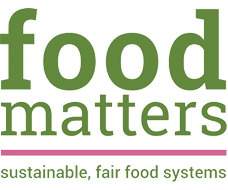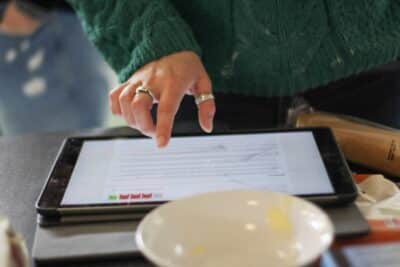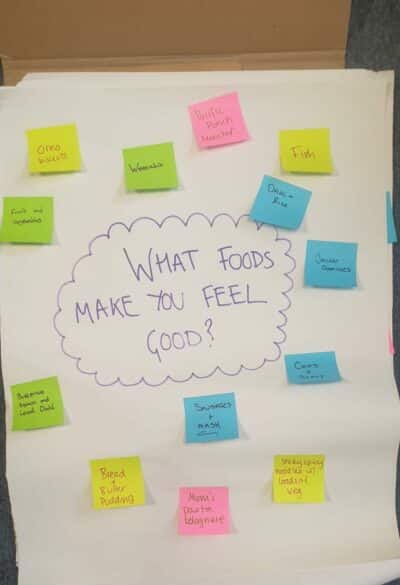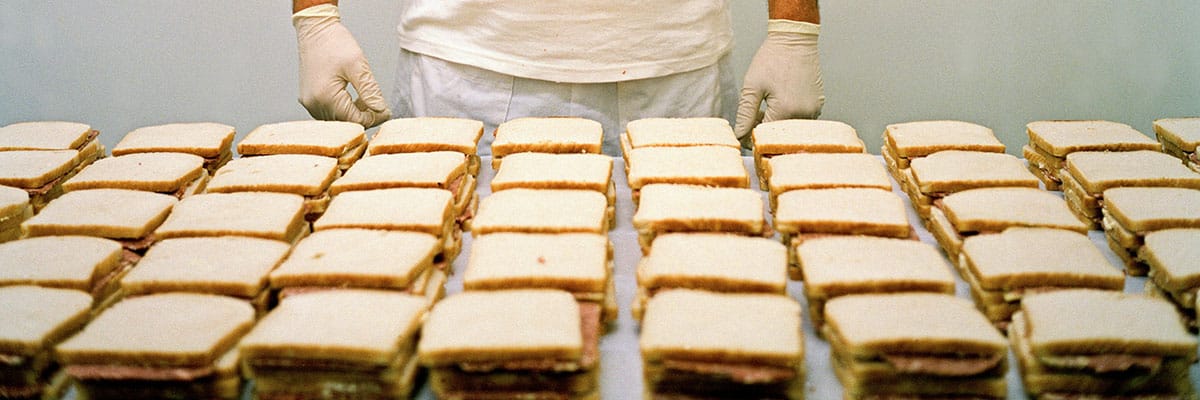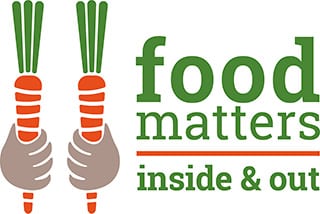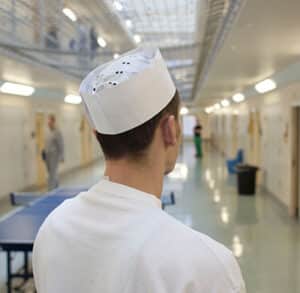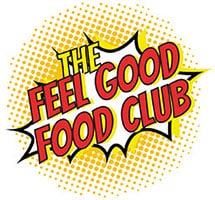Blog by Freya Harrup, October 2024
What is MoodAF?
Mood AF (AndFood) is a 6-week course for young people. The focus is on wellbeing through nutrition, food growing, creativity and movement. The sessions are user led, following a participatory approach, for young people with experience of care and/or insecure housing who are on the cusp of living independently. Mood AF aims to build young people’s confidence and skills with cooking healthy meals on tight budgets, whilst integrating wellbeing activities, so they can thrive as self-supporting young adults who go on to fulfil their potential.
Why do we think it’s important?
Over ten years’ experience of co-producing food courses with marginalised communities have shown us the positive role that food can play in reducing poor physical and mental health and breaking the cycle of social exclusion. These young people are at higher risk of poor social networks, unemployment, lower levels of education and lacking skills to cope with independent living. These experiences are linked to adverse impacts throughout adulthood – an October 2021 policy briefing reported that adults who were in residential care as a child are between 3 and 4 times more likely to report their health as ‘not good’ compared with ‘good’.
A 2022 Ofsted report confirms that many care leavers feel unprepared for independent living and lack skills around cookery, food shopping and money management. One care leaver expressed: “We did some basic bits and pieces in the kitchen at the home – fry an egg, make a cup of tea, you know. When I think about it, would I know how to put a meal together? No. It just was not taught.” There is a gap in provision for these young people to access life skills training in a supportive environment.
Mood AF cultivates wellbeing through a range of determinates: dietary improvements, engagement in learning, building social networks and taking part in social activities. Positive wellbeing has been shown to improve rates of stable employment, housing, and economic stability – areas that care leavers and insecurely housed young people often struggle with.
How does it work/is designed?
Sessions are person-centred and co-designed, meaning that participants’ needs and interests are at the heart of what we do. We take a trauma-informed approach and have a keen awareness of the negative experiences many participants have undergone in educational settings. We therefore aim to support young people rather than instruct them. Sometimes groups and individuals come with set ideas on what they would like to cover, other times we help them by showing them what they could learn about – for example:
- Food and mood/mental health
- Food and energy level
- Gut health
- Skin health
- Nature based activities e.g forest bathing
- Yoga or other movement
- Practical wellbeing tools
- Nutrition through pregnancy, breastfeeding and weaning
All our sessions are interactive and involve a variety of activities and discussion. We include practical tips on budgeting, recipe alterations and food waste, with a focus on integrating this learning into participants lives outside of the session:
‘Being able to take things home to work on them and keep them going is a good way of keeping the information current for young people until it settles in’. – MoodAF stafff attendee
If participants choose, we also include behaviour change theory to help integrate skills into daily life. This could include day-to-day self-care practices or setting achievable life goals. Sessions are run by a nutritionist, and whilst cooking and snack preparation is at the heart of the sessions, we also work closely with other practitioners such as baby massage and yoga to keep our sessions dynamic:
‘The people who run it are really enthusiastic and knowledgeable and they are great at engaging the group. The variety in sessions and activities is great- I always learn a lot’ – Mood AF attendee
What’s next?
We have recently secured some funding for a new project- Food Hits Different. In this action-based research initiative we’ll be working with groups of young people that are experiencing hurdles into adulthood, to explore what healthy eating messaging and good food habit-building might look like when centering their experiences. Together, we’ll explore how to create meaningful messaging around healthy eating, and identify what support young people need to make informed food choices.
If you’re aged between 16-25 and want to shape the conversation on what meaningful health and wellbeing messaging should look like, then we’d love to hear from you – drop us an email at [email protected]
Blog by Freya Harrup, October 2024
What is MoodAF?
Mood AF (AndFood) is a 6-week course for young people. The focus is on wellbeing through nutrition, food growing, creativity and movement. The sessions are user led, following a participatory approach, for young people with experience of care and/or insecure housing who are on the cusp of living independently. Mood AF aims to build young people’s confidence and skills with cooking healthy meals on tight budgets, whilst integrating wellbeing activities, so they can thrive as self-supporting young adults who go on to fulfil their potential.
Why do we think it’s important?
Over ten years’ experience of co-producing food courses with marginalised communities have shown us the positive role that food can play in reducing poor physical and mental health and breaking the cycle of social exclusion. These young people are at higher risk of poor social networks, unemployment, lower levels of education and lacking skills to cope with independent living. These experiences are linked to adverse impacts throughout adulthood – an October 2021 policy briefing reported that adults who were in residential care as a child are between 3 and 4 times more likely to report their health as ‘not good’ compared with ‘good’.
A 2022 Ofsted report confirms that many care leavers feel unprepared for independent living and lack skills around cookery, food shopping and money management. One care leaver expressed: “We did some basic bits and pieces in the kitchen at the home – fry an egg, make a cup of tea, you know. When I think about it, would I know how to put a meal together? No. It just was not taught.” There is a gap in provision for these young people to access life skills training in a supportive environment.
Mood AF cultivates wellbeing through a range of determinates: dietary improvements, engagement in learning, building social networks and taking part in social activities. Positive wellbeing has been shown to improve rates of stable employment, housing, and economic stability – areas that care leavers and insecurely housed young people often struggle with.
How does it work/is designed?
Sessions are person-centred and co-designed, meaning that participants’ needs and interests are at the heart of what we do. We take a trauma-informed approach and have a keen awareness of the negative experiences many participants have undergone in educational settings. We therefore aim to support young people rather than instruct them. Sometimes groups and individuals come with set ideas on what they would like to cover, other times we help them by showing them what they could learn about – for example:
- Food and mood/mental health
- Food and energy level
- Gut health
- Skin health
- Nature based activities e.g forest bathing
- Yoga or other movement
- Practical wellbeing tools
- Nutrition through pregnancy, breastfeeding and weaning
All our sessions are interactive and involve a variety of activities and discussion. We include practical tips on budgeting, recipe alterations and food waste, with a focus on integrating this learning into participants lives outside of the session:
‘Being able to take things home to work on them and keep them going is a good way of keeping the information current for young people until it settles in’. – MoodAF stafff attendee
If participants choose, we also include behaviour change theory to help integrate skills into daily life. This could include day-to-day self-care practices or setting achievable life goals. Sessions are run by a nutritionist, and whilst cooking and snack preparation is at the heart of the sessions, we also work closely with other practitioners such as baby massage and yoga to keep our sessions dynamic:
‘The people who run it are really enthusiastic and knowledgeable and they are great at engaging the group. The variety in sessions and activities is great- I always learn a lot’ – Mood AF attendee
What’s next?
We have recently secured some funding for a new project- Food Hits Different. In this action-based research initiative we’ll be working with groups of young people that are experiencing hurdles into adulthood, to explore what healthy eating messaging and good food habit-building might look like when centering their experiences. Together, we’ll explore how to create meaningful messaging around healthy eating, and identify what support young people need to make informed food choices.
If you’re aged between 16-25 and want to shape the conversation on what meaningful health and wellbeing messaging should look like, then we’d love to hear from you – drop us an email at [email protected]
